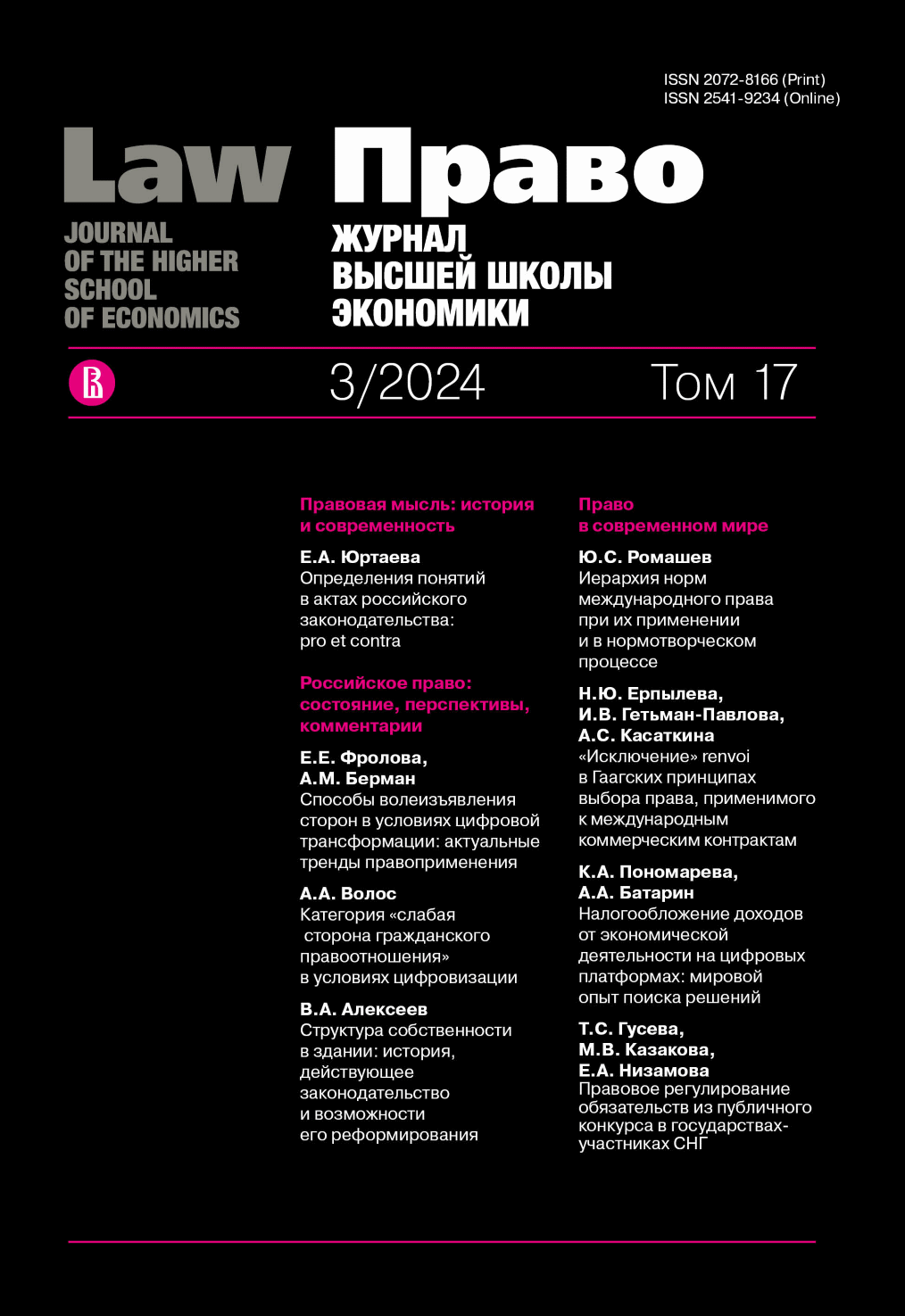Родители как «вторичные потерпевшие» в случае нанесения травмы ребенку
Аннотация
При причинении вреда здоровью в качестве потерпевшего (кредитора) традиционно рассматривается лишь сам пострадавший. Именно его закон наделяет правом на возмещение утраченного дохода, дополнительных расходов на лечение и уход. На практике многие родители пострадавших детей вместо обращения за профессиональными услугами к третьим лицам (сиделкам, психологам и пр.) сами осуществляют необходимый ребенку уход и реабилитацию на ежедневной основе, после чего предъявляют требование к делинквенту о возмещении убытков в виде утраченного заработка. В статье анализируются подходы российских и зарубежных судов к рассмотрению подобных исков, а также примеры прямого законодательного регулирования вопросов, связанных с оплатой безвозмездной помощи, оказываемой пострадавшему его близкими, или возмещением указанным лицам неполученного дохода. Сделан вывод о том, что родитель травмированного ребенка при определенных условиях вправе требовать возмещения неполученного заработка или стоимости осуществляемого лично ухода: необходимость постоянного ухода за ребенком ограничивает родителя в возможности осуществлять трудовую деятельность; ответчиком не доказана возможность обеспечения ребенку постороннего ухода за меньшую сумму и др. При этом стандарт доказывания вынужденного характера прекращения трудовой деятельности не должен быть слишком высоким; достаточно, чтобы соответствующее решение истца отвечало требованиям разумности и добросовестности. De lege lata требования родителей как вторичных потерпевших могут удовлетворяться со ссылкой на положения ст. 15, п. 1 ст. 1064 ГК РФ о полном возмещении вреда и ст. 1080 о праве регресса, либо положения ст. 1102 ГК РФ о взыскании неосновательного сбережения. De lege ferenda целесообразно расширить понятие юридически значимого вреда в случае нанесения травмы физическому лицу, указав на возмещение убытков лицам, оказывающим пострадавшему необходимый уход на безвозмездной основе, и возможность их расчета через не полученный заработок.
Литература
Agibalova E.N. (2021) Tort obligations: a guide. Volgograd: University, 264 p. (in Russ.)
Bishop W. (1982) Economic loss in tort. Oxford Journal of Legal Studies, vol. 2, no. 1, pp. 1–29. DOI: https://doi.org/10.1093/ojls/2.1.1
Chartier Y. (1983) La reparation du prejudice dans la responsabilite civile. Paris: Dalloz, 1050 p.
Commentary to the Civil Code of the Russian Federation (2010) A.P. Sergeev (ed.). Moscow: Prospect, 992 p. (in Russ.)
Egorova M.A., Krylov V.G., Romanov A.K. (2017) Tort obligations and tort liability in the English, German and French law: a tutorial. Moscow: Justitcinform, 376 p. (in Russ.)
Evstigneev E.A. (2017) General tort principle: modern position and prospects of application. First Part. Vestnik grazhdanskogo prava=Civil Law Bulletin, vol. 17, no. 4, pp. 45–83 (in Russ.) DOI: https://doi.org/10.24031/1992-2043-2017-17-4-45-83
Fast I.A. (2020) Determination of the amount of moral harm from “parental damage”. Rossijskij sud’ya=Russian Judge, no. 3, pp. 50–55 (in Russ.) DOI: https://doi.org/10.18572/1812-3791-2020-3-50-55
Gubaeva A.K. (2020) The Russian tort law: contemporary challenges and prospects for development. Zakon=Law, no. 3, pp. 38–48 (in Russ.)
Hiroshi O. (2009) The Japanese Law. Oxford: University Press, 474 p.
Ioffe O.S. (2004) Selected works. Vol. III. Law of obligation. Saint Petersburg: Yuridicheski center Press, 837 p. (in Russ.)
Khadijah M.N., Putery N.J. (2016) No-fault compensation scheme for obstetric injuries: a viable alternative? Malayan Law Journal, vol. 3, pp. 29–49.
Kotiswaran P. (2021) An ode to altruism: how Indian courts value unpaid domestic work. Economic and Political Weekly, no. 36, pp. 45–52. DOI: https://doi.org/10.2139/ssrn.3740179
Larouche P. (2008) ‘Legally relevant damage’ and a priori limits to non-contractual liability in the DCFR. TILEC Discussion Paper no. 2008-045. DOI: https://doi.org/10.2139/ssrn.1313649
Liang Ch.-M., Leflar R. (2024) Taiwan’s medical injury law in action. Emory International Law Review, vol. 38, no. 1, pp. 1–94.
Lopez J., Marcos J.I. (2015) El nuevo baremo de la Ley 35/2015 y su applicacion al ambito laboral. RTSS. CEF, no. 393, pp. 65–100. DOI: https://doi.org/10.51302/rtss.2015.2772
Lugmanov R.R. (2019) Tort law and recovering economic losses. Vestnik ekonomicheskogo pravosudiya=Economic Justice Herald, no 2, pp. 115–153 (in Russ.)
Markesinis B. et al. (2005) Compensation for personal injury in the English, German and Italian law. Cambridge: University Press, 235 p. DOI: https://doi.org/10.1017/CBO9780511493881
Malein N.S. (1962) Compensation for injury to minors. Moscow: Gosyurizdat, 66 p. (in Russ)
Malein N.S. (1965) Compensation for personal injury. Moscow: Yuridicheskaya literatura, 230 p. (in Russ)
Mendelson D. (2005) Jurisprudential legerdemain: damages for gratuitous services and attendant care. Journal of Law and Medicine, vol. 12, no. 4, pp. 402–412.
Principles, definitions and model rules of the European private law (2010) C. von Bar, E. Clive (eds.). Oxford: University Press, 4795 p.
Sartwelle T.P. et al. (2020) Cerebral palsy litigation after fifty years: a hoax on you. Indian Journal of Medical Ethics, vol. 5, no. 4, pp. 295–301. DOI: https://doi.org/10.20529/IJME.2020.093
Shevchenko A.S., Shevchenko G.N. (2013) Tort obligations in the Russian civil law: a guide. Moscow: Statut, 130 p. (in Russ.)
Shiminova M.Y. (1972) Compensation for damage to health. Moscow: Moskovski rabochiy, 120 p. (in Russ)
Van Vleet M.W. (2012) Birth-related injury. In: Elzouki A.Y. et al. (eds.) Textbook of Clinical Pediatrics. Berlin: Springer, pp. 159–175. DOI: https://doi.org/10.1007/978-3-642-02202-9_12
Yagelnitskii A.A. (2019) Trends in court practice in cases of compensation for damages. Zakon=Law, no. 3, pp. 47–55 (in Russ.)
Copyright (c) 2024 Кратенко М.

Это произведение доступно по лицензии Creative Commons «Attribution-ShareAlike» («Атрибуция — На тех же условиях») 4.0 Всемирная.


















